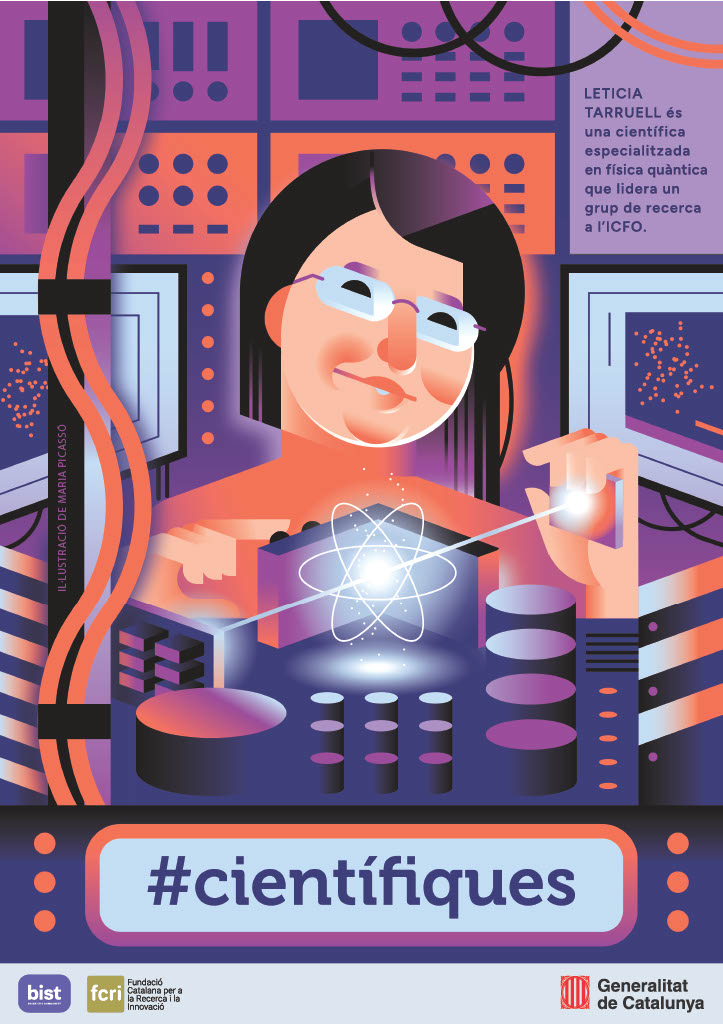2025 Edition
In this section, you will find all the necessary information to participate in the 7th edition of #científiques. Remember that participation is open to scientists from public and private entities in Catalonia, as well as 6th-grade primary school and 1st-year secondary school students from Catalan educational centers. If you have any questions, please refer to the FAQS section.
Central event of #científiques - Program
Tuesday, February 11, 2025 – Paranimf Hall, University of Vic – Central University of Catalonia (UVic-UCC)
9:30 am Arrival of the students from Escola Vedruna Escorial Vic
10:00 am Opening of the event
Josep Eladi Baños Díez, Rector of UVic-UCC
Miquel Gómez Clares, Director General of FCRI
10:10 am Conference and performance
By Olfat Khannous Lleiffe, biotechnologist, researcher at IRB-BSC, and professor at UVic-UCC, accompanied by the show “Who Does Science?” by Patrícia Canut Hund, science communicator, known on social media as Tracy Hund
11:00 am. End of the event and departure
Simultaneously, talks will be taking place at educational centers (schedules arranged individually)
#científiques Meet-up - Program
Wednesday, 5 February 2025 – Auditorium of the Barcelona Biomedical Research Park (PRBB)
10:00 am Opening of the event.
Miquel Gómez Clares, Director general of FCRI
Eduard Vallory i Subirà, Director General of BIST.
Esther Niubó Cidoncha, Minister of Education and Vocational Training of the Government of Catalonia.
Núria Montserrat Pulido, Minister of Research and Universities of the Government of Catalonia and President of FCRI and PRBB.
10:15 am Inspirational talk: “What the diversity of life on Earth can teach us about human health”
Mafalda Dias, Group Leader of Probabilistic Machine Learning and Genomics at the Centre for Genomic Regulation (CRG).
10:40 am Conversation: “AI is also for women: challenges and opportunities for a fairer and more inclusive world”
Karina Gibert Oliveras, Professor and Director of the Intelligent Data Science and Artificial Intelligence Research Center at UPC.
Rosa Maria Gil Iranzo, Lecturer at the Polytechnic School of the University of Lleida (UdL).
Marta P. Estarellas, CEO of Qilimanjaro Quantum Tech, S.L.
12:00 pm Closing of the event and group photo of the #científiques
12:15 pm Refreshments will be served.
Please note access to this event is by invitation only.
#científiques 2025 Promotional Poster

The promotional poster is one of this year’s new features. This image, which will accompany us throughout the 2025 edition, is now available for you to display in classrooms or at your workplace.
From now on, we will illustrate each edition of #científiques with the portrait of a Catalan researcher, created by a local artist. This year, the researcher is Leticia Tarruell, and the artist who drew her is Maria Picassó i Piquer.
Meet them here:
THE PROTAGONIST: Leticia Tarruell, ICREA research professor at ICFO, where she leads a research group in quantum physics.
Leticia Tarruell (Madrid, 1981) is a scientist specializing in quantum physics with photons, atoms, and molecules. She studied physics and music in Madrid, choosing to pursue a career in physics. She earned her Ph.D. at the ENS in Paris and conducted postdoctoral research at ETH Zurich and the Bordeaux Institute of Optics. In 2013, she joined the Institute of Photonic Sciences (ICFO), where she has since led the Ultracold Quantum Gases experimental group. She is the author of scientific articles published in journals such as Nature and Science and has received the 2014 L’Oréal-UNESCO For Women in Science Award, the Real Sociedad Española de Física Award, and an ERC Consolidator Grant.
The research group she leads uses ultracold quantum gases and atoms to design new forms of quantum matter and solve challenging problems in condensed matter and high-energy physics that are difficult to address using traditional classical physics. With a quantum simulator, they cool the atoms of a gas nearly to absolute zero—below -273°C—and study the interactions between atoms and light to create quantum systems in the lab. This enables them to manipulate matter and simulate inaccessible phenomena or materials—such as those found in stars—or even materials that do not yet exist, like superconductors.
She has been passionate about physics from a young age, intrigued by fundamental concepts such as how things work, the Universe, and nature itself. She was also interested in technology and building things by hand. As she said in an interview, “Quantum physics allows me to combine both: doing experiments and building large machines in the lab, with lasers and technology, that we use to answer fundamental questions and understand how nature works.”
🔗 Interview with Leticia Tarruell published on Núvol (in Catalan)
🎞️ Video about Leticia Tarruell on the Barcelona City Council’s YouTube channel (in Spanish)
THE ARTIST: Maria Picassó i Piquer, Architect and Illustrator
Maria Picassó i Piquer (Manresa, 1983) is a Catalan artist. After graduating in Architecture, she soon left this profession to dedicate herself to illustration full-time.
Her style is characterized by the simplification of her drawings, where only the most defining features of the subject remain. She often uses geometric shapes that come together to create faces and objects.
Her main fields of illustration include institutional artwork, editorial illustrations, covers, posters, and advertising. Her works have appeared in publications like ICON (El País), LA Times, Barron’s, Delish, El Correo, Petit Sàpiens, and Diari Ara, among many others. She has illustrated covers for numerous publications, especially in science fiction, including the reissue of Dune (Mai Més and Raig Verd, 2021). This design was selected to appear in the Communication Arts Illustration Annual for May-June 2022, a reference publication in the fields of fine arts and design. Picassó also participated as an illustrator in the “Científicas Ilustradas” project by Aditech/Gobierno de Navarra.
Highly acclaimed in her profession, she has been invited to several conventions across Europe and the United States. She served as a judge for World Press Cartoon in 2018.
#científiques 2025 Calendar
![]()
Registration
Registration will be open from October 24 to December 20, 2024. In the Sign up section of the website, you will find the registration forms for both #científiques and schools, along with the instructions to follow.

Matching
From December 20, 2024, to January 17, 2025, we will work on matching #científiques with educational centers. Between January 20 and 31, we will inform you of the results so that you can coordinate.

#científiques Meet-up
On February 5, 2025, all participating #científiques are invited to this event, which will be held at the Auditorium of the Barcelona Biomedical Research Park (PRBB). We will update you with details about the #científiques Meet-up during January.
![]()
Talks
On February 11, 2025, International Day of Women and Girls in Science, women scientists participating in #científiques will give talks to 6th grade primary school students and 1st year secondary school students across Catalonia. If this date doesn’t work for your talk, feel free to arrange another date with your assigned scientist or school.
Training for Educators: "#científiques: Beyond 11F". Online and recognized by the Department of Education and Vocational Training of the Government of Catalonia.
Description
The course #científiques: Beyond February 11 is a 15-hour accredited training designed to assist educators and teaching staff participating in the #científiques initiative in their day-to-day classroom activities, bringing science and the STEAM identity to children in 6th grade of primary school and 1st year of secondary school.
Participants will learn tools to promote equal access to science through contact with women role models in scientific and technological fields. This training will enrich their teaching practice and provide strategies to inspire and motivate students, especially girls, to view science as an accessible and attractive path for everyone.
The course will introduce the #científiques Teaching Guide, provide resources to teach science and gender perspective in the classroom, and place special emphasis on inquiry-based learning as a useful methodology for science education.
Objectives
- Support educators to make the most of the #científiques visit on February 11, 2025.
- Share resources for learning how to research in the Science classroom.
- Provide tools for educators to incorporate gender perspective practices in the classroom.
Characteristics
- 9 hours of training (7 hours online).
- 6 hours of classroom and individual work.
To obtain the training certificate, participants must attend 80% of the program sessions and complete the assigned tasks.
Registration
Sign up through this link to have your training recognized by the Department of Education and Vocational Training.
Additionally, you will need to register for each online training session in order to receive the link to connect (see the next section).
Sessions
Session 1: #científiques in the classroom and science resources
Date and time: January 16, 2025, from 5:00 PM to 6:00 PM
Pre-registration required here.
Session 2: Learning to research in the science classroom, the art of asking questions
Date and time: January 23, 2025, from 5:00 PM to 7:00 PM
Pre-registration required aquí.
Session 3: Gender perspective in the STEAM field for classroom work. Proposals from INS A. Ferrer in Barcelona
Date and time: January 30, 2025, from 5:00 PM to 7:00 PM
Pre-registration required here.
Session 4: Researcher visit to the classroom
Date and time: February 11, 2025, 2 hours in the morning (time to be agreed)
Format: Preferably in person
Session 5: Closing and evaluation of #científiques
Date and time: March 6, 2025, from 5:00 PM to 7:00 PM
Pre-registration required here.
Trainers
Digna Couso
Physicist and Ph.D. in Science Education, currently an Associate Professor at the Autonomous University of Barcelona (UAB). She directs CRECIM (Research Center for Science and Mathematics Education) and has led numerous research projects, especially in the field of STEM education. Her research focuses on STEM community practice curriculum development, educational material design, inquiry-based science teaching, and teacher training. She has published in numerous scientific journals, presented at more than fifty national and international conferences, and collaborated with various editorial boards and academic projects worldwide.
Verena Blume
Biologist and Ph.D. in Veterinary Microbiology. She has been a Science teacher for ten years and currently works at Angeleta Ferrer Public School in Barcelona, where she is also part of the Research and Teacher Training program. As a STEAM teacher, she fosters curiosity and critical thinking through inquiry-based discovery and project-based learning methodologies, addressing various perspectives of science, including gender, colonialism, capitalism, and speciesism.
Laura Carmona
Holds a degree in Political and Administrative Sciences from UAB and an MSc in Social Development and Conflict from Swansea University – University of Wales. She has always been dedicated to social issues and the educational field, providing guidance and training for teachers. Currently, she is a secondary school teacher at INS Angeleta Ferrer, a public secondary school with a teacher training and research program. Her teaching experience is diverse but always within public institutions. She believes that teacher training and support are essential and has collaborated with Pompeu Fabra University (UPF) in the teacher training master’s program (English) and at Blanquerna, teaching the classroom management module. Now, she collaborates with UAB in the core module of the teacher training master’s program on educational inequalities. She is part of the Feminist Perspective (gender and curriculum) working group of Rosa Sensat and has coordinated the 56th summer school training under the title: “Feminist Education Practices and Reflections.”
Marina Mir
Graduate in Sociocultural Gender Studies and currently studying the Postgraduate in Psychological Care and Community Action, Feminism, and LGBTQ+. She currently works as a coordinator for gender support services. She has experience in leisure education and believes in the transformative potential of education for social structures. She completed her degree internship in Coeducation at Angeleta Ferrer Institute in Barcelona.
Her academic background has enabled her to develop critical thinking and a deep gender perspective when analyzing social phenomena.
Míriam Navarro
Graduate in Biology (University of Barcelona, UB), holds an Experimental Master’s in Biochemistry and Molecular Biology (UB), and a PhD in Neurosciences from the Vall d’Hebron Research Institute (UAB). She conducted her postdoctoral studies at Columbia University (USA), where she spent five years combining research and teaching. She currently directs the educational programs at the Barcelona Institute of Science and Technology (BIST), where she coordinates the Master’s in Multidisciplinary Research and Experimental Sciences. She has collaborated on various national and international research projects and is the first author of fourteen scientific articles. She has balanced research and teaching both in Catalonia (University of Manresa, BIST Dolors Aleu Graduate Centre, affiliated with Pompeu Fabra University) and in the United States (Columbia University). She is also actively involved in various science education initiatives to bring science closer to society.
Training for Scientists: Workshop to Prepare Your Talk
Is this your first time with #científiques, and would you like some initial feedback on your talk? Want to rethink your presentation? Looking for fresh ideas or a new approach?
Sign up for this collaborative workshop where, alongside other #cientifiques participants and professionals in science communication and outreach, you will:
- Review scientific communication tools to explain your research and tailor it to 6th-grade and 1st-year secondary school students.
- Share a brief overview of your talk in small groups.
- Receive feedback and ideas to enhance your presentation.
SESSIONS
January 31, 2025, at 12:00 p.m. Online session in English. Register here.
February 5, 2025, at 1:00 p.m. (after the #cientifiques Meet-up). In person, in Catalan. Register here.
February 6, 2025, at 12:00 p.m. Online session in Catalan. Register here.
Support materials for Scientists and Educators
In the Support materials section of the website, you’ll find a variety of support materials.
If you’re a scientist, you’ll find, among other things, a suggested template for preparing your classroom presentation and social media materials to use for yourself or share with your institution’s communications team. If you can’t attend this year’s training sessions, you can watch videos from previous editions.
If you’re an educator, you’ll find resources like the commitment letter you’ll need to sign to confirm your registration, the Teaching Guide, and other relevant materials.
And don’t forget! Download the promotional poster to display wherever you see fit!
For any questions, check the FAQ page. If you can’t find the answer you’re looking for, feel free to contact us.
